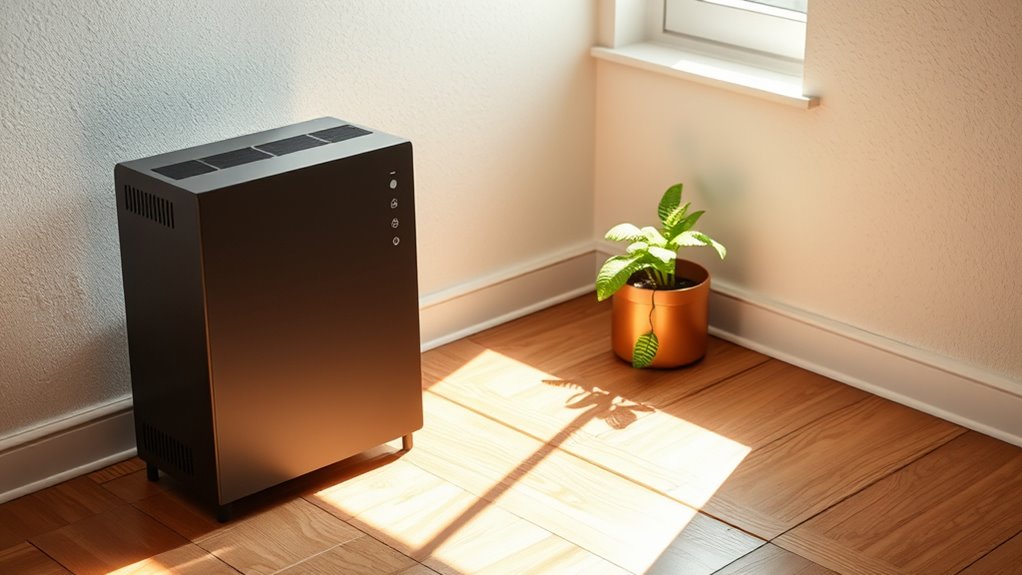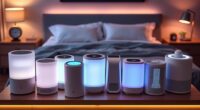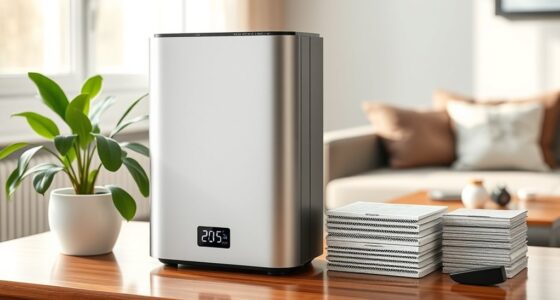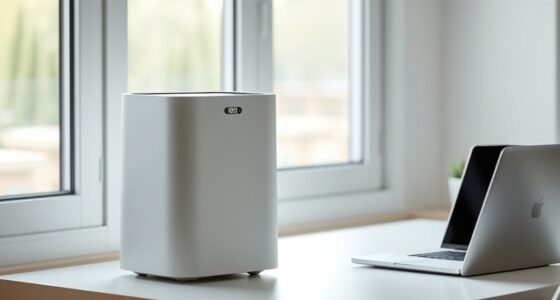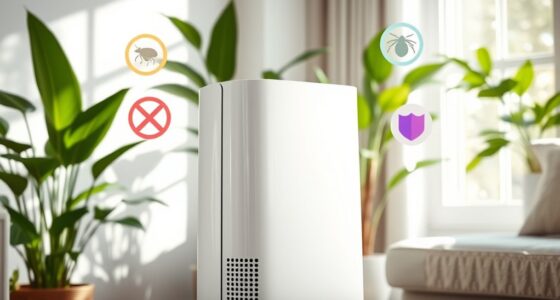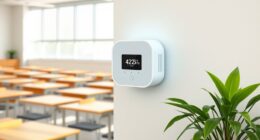Air purifiers mainly remove pollutants and allergens from your indoor air, but they don’t add moisture. If you use a model without humidifying features, they can make your environment feel drier, leading to issues like dry skin and irritated sinuses. This dry air might worsen over time without proper humidity control. To find out how to balance air purification and humidity, keep exploring to discover effective solutions for a healthier indoor environment.
Key Takeaways
- Most air purifiers do not add moisture; they primarily filter pollutants without impacting humidity levels.
- Air purifiers without humidifying features can contribute to drier indoor air in already dry environments.
- Dry air caused by purifiers can lead to discomfort like dry skin and irritated sinuses.
- Using an air purifier in a dry space may worsen dryness unless paired with a humidifier.
- Modern models with combined purifying and humidifying functions help maintain balanced indoor humidity.
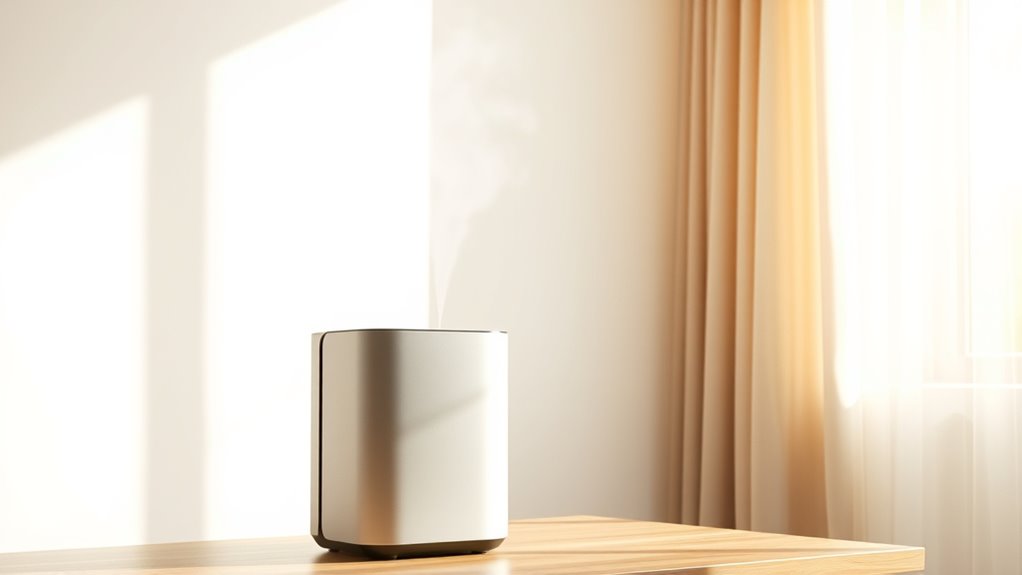
Have you ever wondered how dry air affects the air you breathe, especially when using an air purifier? It’s a common concern because while air purifiers are excellent at removing pollutants, allergens, and airborne bacteria, they don’t add moisture to the air. In fact, some models, especially those without humidifying features, can contribute to dry indoor environments. This dryness can cause discomfort, such as dry skin, irritated sinuses, and even respiratory issues. That’s why understanding how dry air interacts with your indoor environment is important, especially when considering the benefits of humidifiers.
Humidifiers’ benefits go beyond just adding moisture; they help maintain a balanced humidity level that supports overall health and comfort. When the air is too dry, your mucous membranes can become irritated, making you more vulnerable to colds, flu, and respiratory infections. Adding a humidifier can alleviate these issues, improving your breathing and reducing discomfort. Proper humidity levels also help your skin stay hydrated and prevent cracking or itching. To make sure your indoor air remains at an ideal moisture level, it’s wise to conduct air quality testing. This process measures humidity levels and identifies other pollutants, giving you a clear picture of your environment. If tests reveal that your air is too dry, incorporating a humidifier becomes a practical solution. It not only boosts comfort but also complements your air purifier by creating a healthier overall environment.
Many air purifiers don’t have built-in humidifying functions, so they don’t directly affect moisture levels. However, if your home’s air is already dry, using an air purifier alone might worsen the situation. Dry air can lead to increased static electricity, dry nasal passages, and respiratory irritation, which defeats the purpose of cleaner indoor air. By adding a humidifier, you ensure the air remains at a comfortable humidity level, preventing these side effects. You should be cautious, though, because excessive humidity can foster mold growth and dust mites, so regular air quality testing helps you find the perfect balance. Some modern air purifiers come with integrated humidification features, making it easier to maintain ideal air quality and moisture levels simultaneously. Additionally, understanding the role of family photoshoot fails can remind us that unplanned changes in environment, like humidity fluctuations, can impact comfort and health.
Frequently Asked Questions
Can Air Purifiers Increase Indoor Humidity Levels?
Air purifier types generally don’t increase indoor humidity on their own. However, some models, like humidifier purifiers, add moisture to the air, raising indoor humidity levels. If you notice your indoor humidity feels higher, it’s likely due to other factors like moisture sources or the specific air purifier type you use. Always check your device’s features to see if it’s designed to influence indoor humidity.
Do Humidifiers Combined With Air Purifiers Prevent Dry Air?
Combining humidifiers with air purifiers can help prevent dry air, especially in winter. Regular air purifier maintenance ensures peak performance, while air quality sensors monitor humidity and pollutant levels. By maintaining proper humidity, you create a comfortable environment and improve air quality. This combo effectively reduces dryness and airborne irritants, making your indoor space healthier. Just remember to keep both devices clean and properly calibrated for the best results.
Are Certain Air Purifier Models More Likely to Dry Out the Air?
Ever wonder if some air purifiers might be drying out your room more than others? Certain models, especially those with HEPA filters, are less likely to reduce humidity, but others with ozone or ionizing features may inadvertently strip moisture from the air. Your choice of filter types and maintenance practices can make a big difference. Stay vigilant—knowing which models are prone to this can help you maintain a comfortable, balanced environment.
How Do Air Purifiers Affect People With Respiratory Issues?
When you use an air purifier, it can help reduce allergens that trigger your respiratory symptoms. However, if the purifier isn’t well-maintained or has a poor filter, it might circulate allergens or irritants, worsening your condition. You should choose models designed for respiratory issues, ensuring they effectively filter out allergens. Regularly changing filters and keeping the device clean will help minimize any negative effects on your respiratory health.
Can Air Purifiers Cause Skin Dryness or Irritation?
You might wonder if air purifiers cause skin dryness or irritation. While it’s uncommon, some people experience skin irritation or allergic reactions due to dust, pollen, or other particles caught in the purifier. If your skin feels dry or irritated, check your device’s filters and guarantee proper humidity levels. Using a humidifier alongside can help prevent dryness, and cleaning filters regularly minimizes potential allergic reactions.
Conclusion
So, do air purifiers really dry out the air? While they can reduce humidity slightly, most models don’t cause significant dryness. Think about it—if your home feels stuffy or overly dry, wouldn’t you notice? Properly choosing and maintaining your purifier guarantees fresh, comfortable air without the side effects. Isn’t it worth keeping your space both clean and cozy? After all, isn’t breathing easier what really matters?
